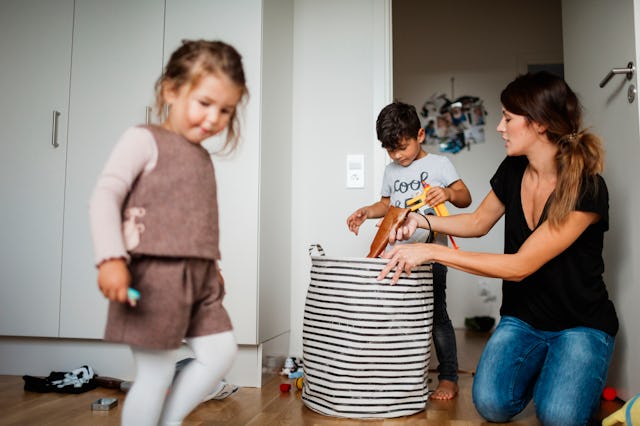Why “Guiding Cooperation” Is The Viral Parenting Method Worth Trying In 2024
Parenting pro Dr. Chelsey Hauge-Zavaleta explains how it works.

Many of us probably grew up during a time when parents didn't work together to get their child's cooperation but, instead, demanded it. In their defense, they were likely just as clueless as most of us feel today about the best way to handle everyday parenting challenges. And the barrage of parenting advice out there hasn't ever made it any easier.
In fact, and without judging any parents' choices, it can often feel like a lot of that advice is based on methods that are either conflicting — too soft or too rigid — or just downright exhausting (as if being responsible for another human wasn't exhausting enough).
So, when the next meltdown over eating two carrot sticks or being asked to clean up toys hits, what is a parent to do? It might be time to try the "Guiding Cooperation" method.
While the best option will always be whatever feels and works best for your own family, trying over and over with no real success can get frustrating fast. At that point, choosing an evidence-based parenting method can help narrow the path toward attaining a thriving family dynamic.
While there are tons to choose from, including parent education programs like Triple P and Parents As Teachers, methods that tend to see things from a child's perspective are often the most effective for at-home challenges. They also get bonus points because they can still be applied to other environments.
In a viral TikTok, parenting coach Chelsey Hauge-Zavaleta, Ph.D., breaks down how to use the Guiding Cooperation method when having a child help clean up — and her advice is pretty brilliant.
Guiding Cooperation, Explained
Enter: Guiding Cooperation, which is refreshingly pretty much like it sounds.
Hauge-Zavaleta explained that what you see her doing in the video is literally *guiding* the child through the process, slowing things down (getting very specific about each element of the request), and taking care to remain present while using positive language.
That’s what the Guiding Cooperation method looks like. First, you get close to your child before giving them any directives (you should be within arm's reach). Hauge-Zavaleta then advises parents to get really specific with their requests and praise even seemingly small efforts.
Instead of telling your child to "clean up their Lego mess," break it down into clear instructions, like, "Start by picking up three yellow blocks."
What you don't necessarily see in the video is that Hauge-Zavaleta’s also planning how she can do this differently in the future, helping her (the parent) to regulate any negative feelings about not "getting it right" that can lead to frustration and reverting to approaches that have been proven not to work.
"I don't have to get it right all the time, and I can even message that to [my] child. It's OK to mess it up sometimes (we all will and do), but because I have solid ground to stand on — the coregulation piece — I am able to fall and get back up again. This is resiliency, and I want it for all the parents and all the children!" says Hauge-Zavaleta.
In other words, this method combines neuroscience and social-emotional learning to get kids to cooperate with their parents while (bonus!) building coregulation skills and resilience.
Why Guiding Cooperation Works
According to Hauge-Zavaleta, what makes the Guiding Cooperation method so successful is that "it not only honors the co-regulatory process between child and parent, but also "[...] centers on staying connected and focusing on the child's perspective, which is just so very located in the here and now! Most of us parents have so much going on that we are very future-focused, and it's a huge shift to move into our child's perspective. It's very important to take slow, small steps forward that match the child's pace."
Hauge-Zavaleta believes that most parents want to be positive and gentle but maybe weren't parented that way, making it easy to return to old ways. "It is about rewriting our reactivity and learning to shift our perspective on childhood," she explains, "but also learning to shift our perspective on parenting."
The Most Important Piece of Advice
But perhaps her most meaningful piece of advice is for parents to remember that these challenging times won't last forever.
"It's so key to remember that if a child is having a tough time, it's probably just a tricky moment and not a tricky lifetime. It can feel like the minutes creep by — like every single minute is tricky — and that is the place to reorient to this 'trickiness' being a moment, not a lifetime," emphasizes Hauge-Zavaleta.
To that end, she also strongly encourages parents to remember to recognize and praise the small things that not only their kids get right but that they get right.
This article was originally published on